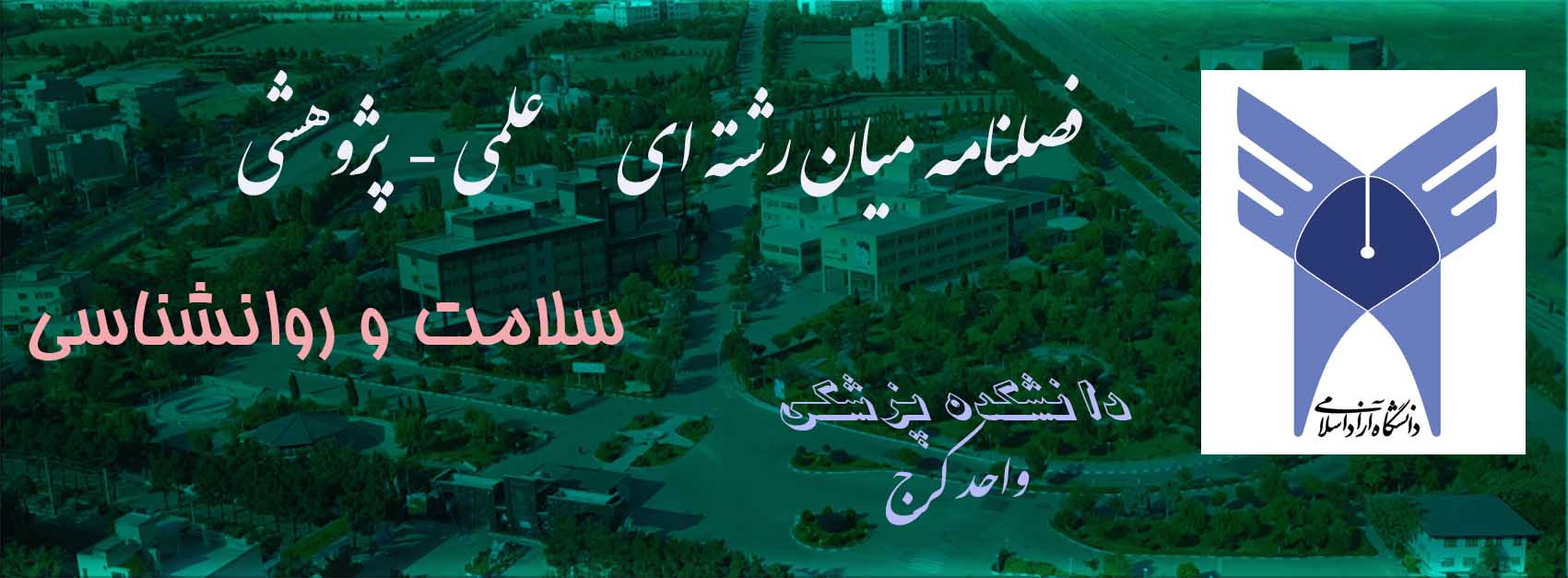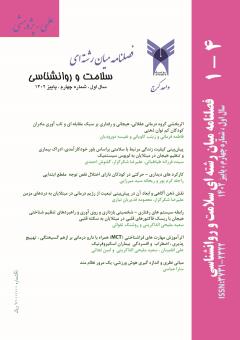اثربخشی گروهدرمانی عقلانی، هیجانی و رفتاری بر سبک مقابلهای و تابآوری مادران کودکان کمتوان ذهنی. (نویسندگان : فاطمه فرمانی / زینب کاویانی / نفیسه دورودیان)
محورهای موضوعی : روانشناسی سلامت افراد با نیازهای ویژه
کلید واژه: گروهدرمانی عقلانی, هیجانی و رفتاری, سبک مقابله ای, تابآوری, کمتوان ذهنی,
چکیده مقاله :
چکیده هدف این پژوهش بررسی اثربخشی گروهدرمانی عقلانی، هیجانی و رفتاری بر سبک مقابلهای و تابآوری مادران کودکان کمتوان ذهنی بود. روش پژوهش از نوع نیمه آزمایشی با پیشآزمون - پسآزمون و گروه کنترل بوده است. نمونه این پژوهش شامل 60 مادر دارای کودک کمتوان ذهنی مرکز توانبخشی شفا شهر قزوین با تابآوری و سبک مقابله¬ای کم بودند که با استفاده از روش نمونه گیری در دسترس به طور همتاسازی انتخاب شدند. این افراد از نظر سن، وضعیت اقتصادی - اجتماعی، عدم ابتلا به بیماریهای جسمانی، دارا بودن یک انحراف معیار پایین تر در پرسشنامههای سبک مقابلهای Folkman & Lazarus (1986) و تابآوری Connor & Davidson (2003) و سایر متغیرهای مورد نظر پژوهش همگون بودند. سپس گروه نمونه به طور تصادفی به دو گروه آزمایش و کنترل تقسیم شدند. در مورد گروه آزمایش 8 جلسه¬ 90 دقیقهای گروهدرمانی عقلانی، هیجانی و رفتاری، اجرا گردید اما در مورد گروه کنترل هیچ مداخلهای صورت نگرفت. دادههای حاصل با استفاده از تحلیل کواریانس چند متغیری (مانکوا) تجزیهوتحلیل شده است. یافتههای پژوهش نشان دهنده اثربخشی گروهدرمانی عقلانی، هیجانی و رفتاری بر مولفههای سبک مقابلهای و مولفههای تابآوری مادران کودکان کمتوان ذهنی بود (سطح معناداری کمتر یا مساوی 0.05).
Abstract The purpose of this study was to investigate the effectiveness of rational, emotive, behavior group therapy on the coping style and resilience of mothers of mentally retarded children. The research method was semi-experimental with pre-test-post-test and control group. The statistical population included 60 mothers with mentally retarded children of Shafa rehabilitation center in Qazvin city with low resilience and coping styles, which were selected using available sampling method. These people are homogenous in terms of age, socio-economic status, lack of physical diseases, having a lower standard deviation in the questionnaires of coping style by Lazarus and Folkman (1985) and resilience by Konver and Davidson (2003) and other variables of the research. Then the subjects were randomly divided into two experimental and control groups. In the case of the experimental group, 8 sessions of 90-minute rational, emotive, behavior group therapy were implemented, but no intervention was done in the case of the control group. The resulting data were analyzed using multivariate analysis of covariance (MANCOVA). The research findings showed the effectiveness of rational, emotional and behavioral group therapy on coping style components and resilience components of mothers of mentally retarded children(significance level less than or equal to 0.05).
منابع
Andini, R., Hafina, A., & Farida, E. (2020). Rational Emotive Behaviour Therapy Counselling with Imagery Technique to Improve Resilience of Teenage as Victims of Divorce. In International Conference on Elementary Education. 2, (1), 220-236. e-ISSN: 2808-8263.
Asadpour, S. (2022). The Effect of of Rational-Emotive-Behavioral Therapy (REBT) on Resiliency of Mothers of Children with Phenylketonuria (PKU). Pars Journal of Medical Sciences, 15(4), 29-35. DOI:10.52547/jmj.15.4.29. [Persian].
Asnaani, A., Alpert, E., McLean, C. P., & Foa, E. B. (2015). Resilient but addicted: the impact of resilience on the relationship between smoking withdrawal and PTSD. Journal of psychiatric research, 65, 146-153. DOI:10.1016/j.jpsychires.2015.03.021.
Balkıs, M., & Duru, E. (2019). The protective role of rational beliefs on the relationship between irrational beliefs, emotional states of stress, depression and anxiety. Journal of Rational-Emotive & Cognitive-Behavior Therapy, 37(1), 96-112. DOI:10.1007/s10942-018-0305-7.
Berjis, M., Hakim Javadi, M., Taher, M., Lavasani, M. G., & Hossein Khanzadeh, A. (2013). A comparison of the amount of worry, hope and meaning of life in the mothers of deaf children, children with autism, and children with learning disability. Journal of Learning Disabilities, 3(1), 6-27. doi: jld-3-1-92-7-1. [Persian]
Byra, S., & Ćwirynkało, K. (2022). Resilience, coping, and posttraumatic growth in fathers of children with intellectual disabilities: Stress as moderator. Family Relations. 8(2), 106. doi.org/10.1111/fare.12750.
Connor, K. M., & Davidson, J. R. (2003). Development of a new resilience scale: The Connor‐Davidson resilience scale (CD‐RISC). Depression and anxiety, 18(2), 76-82. DOI: 10.1002/da.10113 .
Deen, S., Turner, M. J., & Wong, R. S. (2017). The effects of REBT, and the use of credos, on irrational beliefs and resilience qualities in athletes. The Sport Psychologist, 31(3), 249-263.
Ede, M. O., Okeke, C. I., Chinweuba, N. H., Onah, S. O., & Nwakpadolu, G. M. (2022). Testing the efficacy of family health-model of REBT on family values and quality of family life among parents of children with visual impairment. Journal of Rational-Emotive & Cognitive-Behavior Therapy, 40(2), 252-277. DOI: 10.1007/s10942-021-00409-z .
Esmaeilpour Dilmaghani, R., Panahali, A., Aghdasi, A. N., & Khademi, A. (2022). The Effectiveness of Group Logo Therapy on Death Anxiety, Feeling of Loneliness and Meaning of Life in the Elderly Women with Fear of Coronavirus. Aging Psychology, 8(2), 147-135. doi: 10.22126/jap.2022.7755.1622. [Persian]
Folkman, S., & Lazarus, R. S. (1986). Stress processes and depressive symptomatology. Journal of abnormal psychology, 95(2), 107. DOI: 10.1037//0021-843x.95.2.107.
Hyland, P., Shevlin, M., Adamson, G., & Boduszek, D. (2014). The moderating role of rational beliefs in the relationship between irrational beliefs and posttraumatic stress symptomology. Behavioural and Cognitive Psychotherapy, 42(3), 312-326. DOI:10.1017/S1352465813000064
Jowkar, B., Friborg, O., & Hjemdal, O. (2010). Cross‐cultural validation of the Resilience Scale for Adults (RSA) in Iran. Scandinavian journal of psychology, 51(5), 418-425. doi.org/10.1111/j.1467-9450.2009.00794.x
Kumpfer, K. L. (2002). Factors and processes contributing to resilience: The resilience framework. Resilience and development: Positive life adaptations, 179-224. DOI:10.1007/0-306-47167-1_9.
Masten, A. S., Lucke, C. M., Nelson, K. M., & Stallworthy, I. C. (2021). Resilience in development and psychopathology: Multisystem perspectives. Annual Review of Clinical Psychology, 17, 521-549. doi.org/10.1146/annurev-clinpsy-081219-120307.
Noormohamadi, S. M., Arefi, M., Afshaini, K., & Kakabaraee, K. (2019). The effect of rational-emotive behavior therapy on anxiety and resilience in students. International Journal of Adolescent Medicine and Health, 34(1), 20190099. doi.org/10.1515/ijamh-2019-0099. [Persian].
Olsson, C. A., Bond, L., Burns, J. M., Vella-Brodrick, D. A., & Sawyer, S. M. (2003). Adolescent resilience: A concept analysis. Journal of adolescence, 26(1), 1-11. DOI: 10.1016/s0140-1971(02)00118-5 .
Ranaee, Z., Ghanaei Chamanabad, A., Kimiaee, S. A., & Mansouri, A. (2020). The effectiveness of rational emotive behavior group therapy on the executive functions and mental health in mothers of children with attention-deficit/hyperactivity disorder. Clinical psychology and personality, 15(2), 133-142. 10.22070/cpap.2020.2823. [Persian].
Shirazi, M., Khan, M. A., & Khan, R. A. (2011). Coping strategies: a cross-cultural study. Romanian Journal of Psychology, Psychotherapy and Neuroscience, 1(2), 284-302. DOI:10.52547/jmj.16.3.30. [Persian].
Ugwu, J. C. (2018). Rational emotive behaviour therapy (REBT): An intervention strategy for counselling parents of children living with disability. American Journal of Educattonal Research, 6(3), 214-219. DOI: 10.12691/education-6-3-9.
Ugwuanyi, L. T., Egbe, C. I., Nnamani, A. P., Ubah, J. C., Adaka, T. A., Adama, G. N., ... & Otu, M. S. (2022). Rational emotive health therapy for the management of depressive symptoms among parents of children with intellectual and reading disabilities in English language. Medicine, 101(32), e30039. DOI: 10.1097/MD.0000000000030039.

